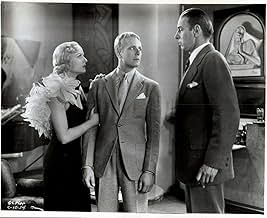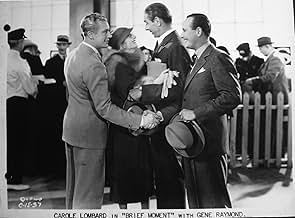A dissolute rich society boy marries a worldly nightclub singer, and she begins to have a wholly unexpected effect on him.A dissolute rich society boy marries a worldly nightclub singer, and she begins to have a wholly unexpected effect on him.A dissolute rich society boy marries a worldly nightclub singer, and she begins to have a wholly unexpected effect on him.
- Director
- Writers
- Stars
Theresa Maxwell Conover
- Mrs. William Deane
- (as Theresa Maxwell)
Allan Cavan
- Mr. Lyon
- (uncredited)
Bill Elliott
- Nightclub Patron
- (uncredited)
Mary Gordon
- Cook
- (uncredited)
Ben Hall
- Office Boy
- (uncredited)
Selmer Jackson
- Conover
- (uncredited)
Tom London
- Thug
- (uncredited)
- Director
- Writers
- All cast & crew
- Production, box office & more at IMDbPro
Featured reviews
Gene Raymond and Carole Lombard, both 25, star in one of the abundant upper crust society pictures made in the early 1930s. Raymond is Rodney Deane, and brings singer Abbey Fane (Lombard) home to meet the family. Abbey is quite cordial to Deane's family, but they are less than enthusiastic to meet her, and things go downhill from there. Lombard had been in films, silents & talkies, for 10 years already, so she is a little more polished here. No real surprises in this one; they needed a comical sidekick, like Edward Everett Horton, or Eric Blore to spice things up. In this one, Abbey does have a sidekick "Steve" (Arthur Hohl) , but he has a small, bland part. She would also make Lady by Choice with Hohl, and Mr. & Mrs. Smith with G. Raymond. A pleasant little film, all neatly wrapped up in an hour & 10 minutes. The film production code must have kicked in already at Columbia Pictures, since it is scrubbed clean of any naughty lines or double entendres. Lombard even sings a song (as of today, its not listed in the "soundtracks" section yet.. anyone know that song?) Good to see performances by Lombard and Raymond, but it is light fluff, and the actors weren't challenged.
Carole Lombard wanted to get out of her next project at Paramount, "A Girl Without a Room" and so went to Harry Cohen at Columbia and asked him to find her something better. He came up with this respectable play by S.N. Behrman. The two main characters, Abby and Rodney, are very ably and sympathetically portrayed, and this saves the picture. On the other hand, Gene Raymond's "best friend" in the picture, Sig, played by Monroe Owsley is a perfect devil, tempting Rodney at every opportunity to ignore his wife and instead spend his nights drinking and his days at the race track. Sig is the personification of evil because he actually doesn't know any other reality that the one he's living sponging off his rich friend, Rodney. Carole on the other hand recognizes the potential in Rodney and does everything in her power to save him.
This film is interesting and enjoyable light soap opera fair. At one point when Carole's character almost looses her composure in front of Rodney's father, the viewer is ready to applaud the explosion, but alas the moment passes. This film could have been well served by a little more action and violent emotion. Perhap's the problem stems from the rather static direction of director David Burton. This is also the first film of Carole's to benefit from the cinematography talents of Ted Tetzlaff. He was able to light Carole in such a way that removed that certain hardness from her face evident in earlier pictures.
This film is interesting and enjoyable light soap opera fair. At one point when Carole's character almost looses her composure in front of Rodney's father, the viewer is ready to applaud the explosion, but alas the moment passes. This film could have been well served by a little more action and violent emotion. Perhap's the problem stems from the rather static direction of director David Burton. This is also the first film of Carole's to benefit from the cinematography talents of Ted Tetzlaff. He was able to light Carole in such a way that removed that certain hardness from her face evident in earlier pictures.
Typical quick time 'soap opera' churned out by all the studios to fulfill their theater chain commitments. This COLUMBIA PICTURES effort clocks in at 71 minutes and entertains for most of them. Not a classic but well worth watching.
The story is a typical one of the period, working girl played by Carole Lombard (ABBY FANE) falls in love and marries upper crust scion. Being in 'show business' she does not meet with approval of her in-laws. The husband played by Gene Raymond (RODNEY DEANE) is a aimless but wealthy drifter heavily under the influence of his friend played by Monroe Owsley (SIG).
ABBY keeps trying to get RODNEY to stand on his own feet and become the man she believes he is. SIG at his parasitical best tries to hold on to a good thing, which means plenty of Booze, Night Clubs and 'Fast Times'! ABBY seeks help from RODNEYs' family to get him on the straight path, but no luck. Usual misunderstandings, separation and then RODNEY has a epiphany realizing ABBY was right all along. Redeems himself and true love triumphs.
Carole Lombard portrays her role with intelligence and sensitivity. Hard to believe this attractive and lithe actress the previous decade was a chubby comedian at MACK SENNETT. Gene Raymond a amiable though limited actor fulfills what is required of him. Monroe Owsley has his parasite gig down to a 'T', making a career of such roles. Though his character of 'SIG' is always in the company of women you get the feeling he swims both ways and his friendship with RODNEY may be more then platonic.
The story is a typical one of the period, working girl played by Carole Lombard (ABBY FANE) falls in love and marries upper crust scion. Being in 'show business' she does not meet with approval of her in-laws. The husband played by Gene Raymond (RODNEY DEANE) is a aimless but wealthy drifter heavily under the influence of his friend played by Monroe Owsley (SIG).
ABBY keeps trying to get RODNEY to stand on his own feet and become the man she believes he is. SIG at his parasitical best tries to hold on to a good thing, which means plenty of Booze, Night Clubs and 'Fast Times'! ABBY seeks help from RODNEYs' family to get him on the straight path, but no luck. Usual misunderstandings, separation and then RODNEY has a epiphany realizing ABBY was right all along. Redeems himself and true love triumphs.
Carole Lombard portrays her role with intelligence and sensitivity. Hard to believe this attractive and lithe actress the previous decade was a chubby comedian at MACK SENNETT. Gene Raymond a amiable though limited actor fulfills what is required of him. Monroe Owsley has his parasite gig down to a 'T', making a career of such roles. Though his character of 'SIG' is always in the company of women you get the feeling he swims both ways and his friendship with RODNEY may be more then platonic.
So one cliché, the greedy gold digger, is subverted and replaced by another one, the spoiled heir redeemed through real hard work. This is a one-idea morality tale, and probably not a particularly original one at that.
Yet Carole Lombard and Gene Raymond are very fine, dialogues are brisk and the tempo lively. Some of the supporting actors are also worth a mention - Arthur Hohl as the torch singer's caring boss, friend and wishful would-be husband, Herbert Evans who has a very funny scene as a butler with some useful experience of dealing with his master's hangovers - he looks and sounds like a twin brother of Edward Everett Horton of Lubitsch's fame. That's quite enough to make this simple-minded, unambitious story quite worth watching.
Brief Moment is a moralistic melodrama, starring Carole Lombard and Gene Raymond.
Instead of the bar singer, a gold-digger, who hunts down a millionaire to live in leisure and abundance for the rest of her life, we have a young, idealistic and passionate woman who intends, through marriage and love, devoted to her husband, to transform an alcoholic and idle playboy into a modest worker, proud to earn his living by his own means.
As a script it is weak and unconvincing. American moralism, which makes Lombard a guardian angel, hidden in the vicious night of the city, to save a young millionaire from himself, from bad companies and from the vices of abundance and a frivolous life.
A role reversal that would have pleased some audiences in the 1930s, but today, honestly, doesn't convince anyone.
A bearable film, just for the pleasure that it is, always, to see Carole Lombard fill the screen with her charm and elegant beauty.
Instead of the bar singer, a gold-digger, who hunts down a millionaire to live in leisure and abundance for the rest of her life, we have a young, idealistic and passionate woman who intends, through marriage and love, devoted to her husband, to transform an alcoholic and idle playboy into a modest worker, proud to earn his living by his own means.
As a script it is weak and unconvincing. American moralism, which makes Lombard a guardian angel, hidden in the vicious night of the city, to save a young millionaire from himself, from bad companies and from the vices of abundance and a frivolous life.
A role reversal that would have pleased some audiences in the 1930s, but today, honestly, doesn't convince anyone.
A bearable film, just for the pleasure that it is, always, to see Carole Lombard fill the screen with her charm and elegant beauty.
Did you know
- TriviaIn an early bit of dialogue, Gene Raymond's character listens to his parents say he shouldn't marry a blues singer, and he replies, "Whom should I marry - Schumann-Heink?," referring to a famous opera singer who had just retired in 1932. Ironically, when Raymond himself married in 1937 his bride was an opera singer as well as a movie star: Jeanette MacDonald.
- GoofsIn the montage showing Abby and Rodney living the high life after they are married, the image of William Deane signing Rodney's $4000 allowance check with the same date (October 15th, 1932), and the same check number is used twice, even though several months have supposedly passed between checks.
- Quotes
Abby Fane: Dear, why do you want to marry me?
Rodney Deane: I happen to be terribly in love with you.
Abby Fane: Is that enough?
- Crazy creditsCredits appear as electric light signs in Times Square.
- SoundtracksSay What You Mean, and Mean What You're Saying to Me
(uncredited)
Written by Gerald Marks and Joe Young
Performed by Carole Lombard
Details
- Release date
- Country of origin
- Language
- Also known as
- Skandal i societén
- Production company
- See more company credits at IMDbPro
- Runtime
- 1h 9m(69 min)
- Color
- Aspect ratio
- 1.37 : 1
Contribute to this page
Suggest an edit or add missing content








































